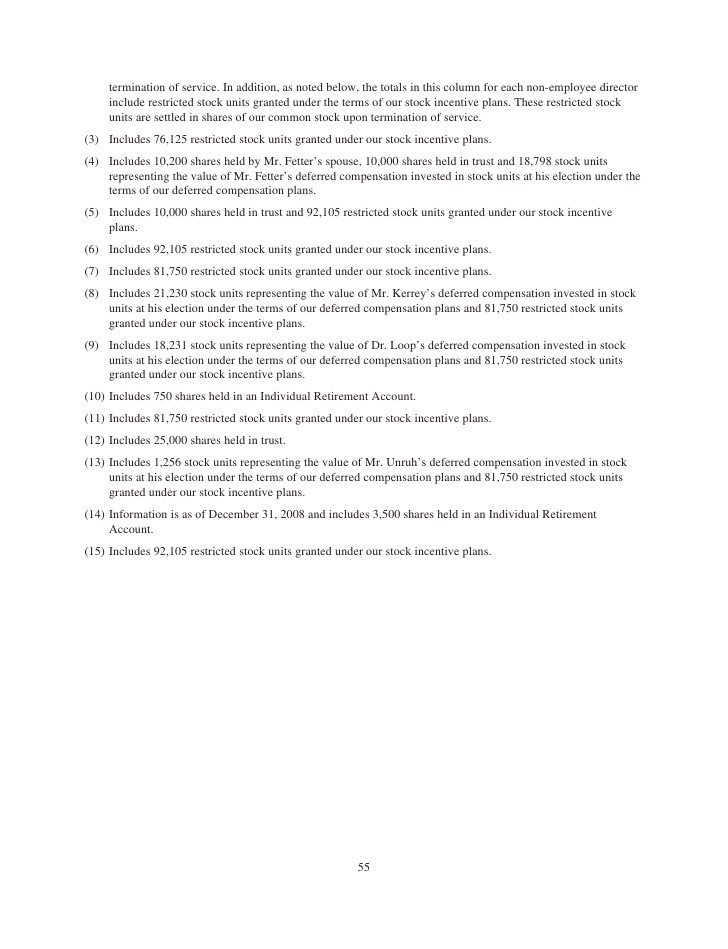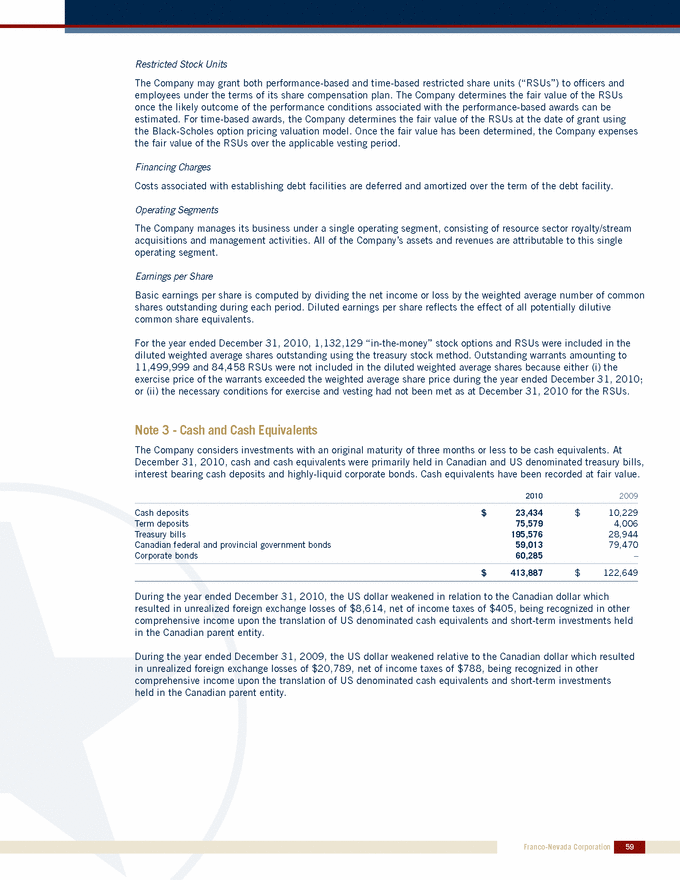Terms of the Restricted Stock Units granted
Post on: 28 Май, 2015 No Comment

Exhibit (10)(q)
Restricted Stock Units (RSUs)
What are RSUs?
Each “restricted stock unit” – also called an “RSU” or a “unit” – represents one hypothetical share of McDonald’s common stock. RSUs are granted under the 2001 Plan and are subject to the terms of the 2001 Plan and this Prospectus.
If you have received an award of RSUs, you must remain employed by McDonald’s until the end of the vesting period in order for the RSUs to vest, subject to exceptions described below. In some cases, vesting may also be conditioned on performance goals. The vesting period and any applicable performance goals are specified in the grant materials provided to you with respect to your RSUs.
RSUs are paid out either in shares of McDonald’s common stock or in cash, at McDonald’s discretion. Payout will, subject to certain exceptions described below, occur as soon as administratively practicable after vesting. Each reference herein to the payout of RSUs “as soon as administratively practicable” following termination of employment or another event shall require the RSUs to be paid out within ninety (90) days following the specified event.
Does the grant of RSUs provide me with any shareholder rights?
No. RSUs are not actual shares of stock, so you will not receive dividends on your units and you will have no voting rights with respect to your units. If your RSUs are paid out in shares of McDonald’s common stock, you will have rights as a shareholder once you receive those shares.
When do my RSUs vest?
Typically on the third anniversary of the grant date. As explained above under “What are RSUs? ”, your RSUs will vest in accordance with the terms set forth in the confirmation sheet indicating the exact number of RSUs that you have been granted. Special rules apply if your employment terminates before the end of the vesting period, as explained below under “What happens to my RSUs if I terminate employment before they vest? ” Special rules also apply if a change in control of McDonald’s occurs before the end of the vesting period, as explained below under “Other Information-Change in Control”.
What does “vesting” mean for my RSUs?
Vesting means that you have satisfied the service requirement and, if applicable, the performance requirement and earned your RSUs.
You will receive a payout of your vested RSUs as soon as is administratively practicable after vesting, subject to certain exceptions described below in the cases of termination of employment or change in control prior to the originally scheduled vesting date. The payout of RSUs will be made either in shares of McDonald’s common stock or in cash, as McDonald’s decides. If McDonald’s decides to pay in shares, you will receive a number of shares of McDonald’s common stock equal to the number of your vested RSUs, subject to tax withholding and any applicable fees, as described below. If McDonald’s decides to pay in cash, you will receive a cash payment equal to the value of that number of shares at the close of business on the day the RSUs vest, subject to tax withholding and any applicable fees, as described below. If you receive a payout in shares, you will then have dividend, voting and other shareholder rights as to those shares.
What is the U.S. federal income tax treatment of an RSU?
The following discussion is limited to United States federal income tax laws applicable to RSU recipients who are both citizens and residents of the United States. The United States federal income tax treatment of RSUs granted to other recipients may differ. If you are a citizen of the United States and a resident of another country, or a resident of the United States and a citizen of another country, you are subject to United States federal income tax laws and you may also be subject to the tax laws of other countries. The discussion does not address the possible impact of the tax laws of other countries, which may provide for different tax consequences to recipients who are subject to such laws. Also, this discussion does not address the possible impact of the short-swing profit recovery rules of Section 16 of the Securities Exchange Act of 1934, as amended, on the taxation of executive officers’ RSUs. You should consult your tax advisor about the tax consequences of RSUs, including the relevance to your particular situation of the considerations discussed below. This discussion describes the tax law in effect on the date of this Prospectus and could change as a result of amendments to the law.
Non-U.S. Tax Consequences. If you are not both a citizen and a resident of the United States, please consult your Guide to Issues in your country for tax considerations relating to your RSUs.

General. Generally you will have taxable compensation income when you receive your RSU payout, regardless of whether the payout is in shares or cash. The amount of ordinary income will be equal to the number of your RSUs multiplied by the NYSE composite closing price of the McDonald’s common stock at vesting. If the payout is in shares, McDonald’s will require share withholding at the minimum statutory withholding rates in effect a the time of payment to cover, in part, your tax obligation. If the payout is in cash, McDonald’s will apply required withholding procedures.
Tax under Section 409A on Deferred Compensation. In late 2004, a new Section 409A (“Section 409A”) was added to the Internal Revenue Code governing the taxation of certain deferred compensation. McDonald’s believes that the terms of RSUs are such that you will not be subject to tax penalties under this tax law as a result of receiving these awards. The Company reserves the right to modify grants if necessary to avoid the imposition of these tax penalties.
State and Local Taxes. Settlement of RSUs may also be subject to state and local taxation which varies from location to location.
Effect on McDonald’s. The Company is generally entitled to a tax deduction in the same amount and in the same year in which you recognize ordinary income resulting from the settlement of RSUs.
When is the income from RSUs taxable to non-U.S. recipients?
Please refer to your Guide to Issues in your country and consult with your personal tax advisor.
What happens to my RSUs if I terminate employment before they vest?
The treatment of your RSUs upon termination of your employment before the end of the vesting period depends on the reason for your termination. The following sections describe the treatment of your RSUs upon termination of employment. Each reference herein to the payout of RSUs “as soon as administratively practicable” following termination of employment or another event shall require the RSUs to be paid out within ninety (90) days following the specified event.














